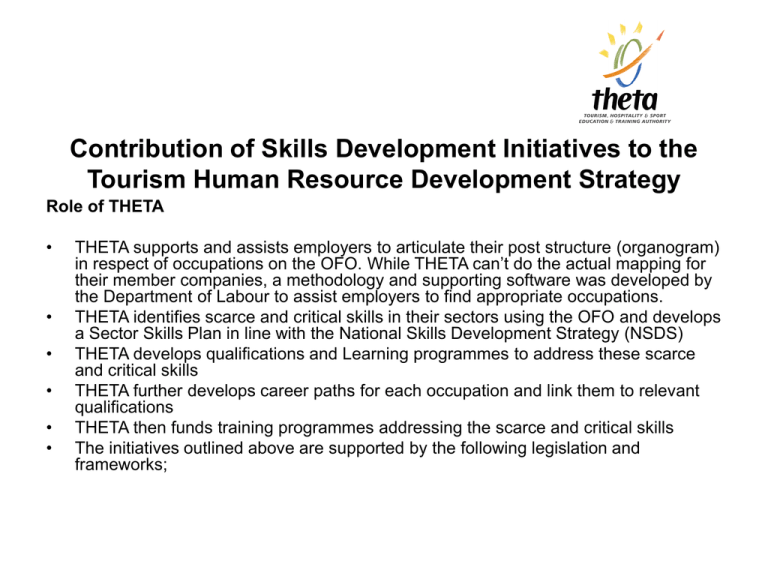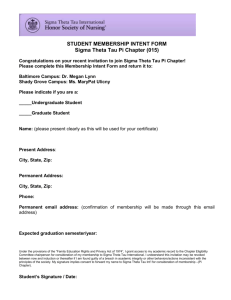Contribution of Skills Development Initiatives to the Tourism Human
advertisement

Contribution of Skills Development Initiatives to the Tourism Human Resource Development Strategy Role of THETA • • • • • • THETA supports and assists employers to articulate their post structure (organogram) in respect of occupations on the OFO. While THETA can’t do the actual mapping for their member companies, a methodology and supporting software was developed by the Department of Labour to assist employers to find appropriate occupations. THETA identifies scarce and critical skills in their sectors using the OFO and develops a Sector Skills Plan in line with the National Skills Development Strategy (NSDS) THETA develops qualifications and Learning programmes to address these scarce and critical skills THETA further develops career paths for each occupation and link them to relevant qualifications THETA then funds training programmes addressing the scarce and critical skills The initiatives outlined above are supported by the following legislation and frameworks; ….LEGISLATIONS AND FRAMEWORKS • Skills Development Amendment Act, Act No. 37 0f 2008 was enacted to amend the Skills Development Act, 1998. The Act repeals remaining sections of the current Manpower Training Act, 1981. The Act has changed certain definitions and of importance is the definition of a learning programme which includes a learnership, an apprenticeship, a skills programme and any other prescribed learning programme which includes a structured work experience component. • National Qualifications Framework Act, Act No. 67 0f 2008 was enacted to provide for the National Qualifications Framework. The Quality Councils (QCs) are the new, sector-based structures that will be responsible for the development and quality assurance of qualifications in their sub-frameworks of the NQF. The NQF will henceforth be organised in three co-ordinated sub-frameworks, viz. for General and Further Education and Training, for Higher Education, and for Trades and Occupations. …QUALITY COUNCIL FOR TRADES & OCCUPATIONS (QCTOs) • Quality Council for Trades and Occupations (QCTO), – A skills development forum in each province, – Organising Framework for Occupations (OFO) . The Organising Framework for Occupations is a skills based, coded classification system. It is built on similar principles to those of the South African Standard Classification of Occupations (SASCO), familiar to all players through its use by Stats-SA in October Household and Labour Force Surveys. SASCO was also used earlier in the Department of Labour’s employment equity reporting format, however, moving into the future SASCO will no longer be the basis for reporting equity. The OFO represents a significant enhancement on SASCO for skills development planning and implementation purposes in that it captures all jobs in the form of occupations (Similar to SASCO) ….ORGANISING FRAMEWORK FOR OCCUPATIONS (OFOs) Groups occupations into successively broader categories and hierarchical levels based on similarity of tasks, skills and knowledge. In essence, the Organising Framework for Occupations (OFO) is a coded occupational classification system. It is the Department of Labour’s key tool for identifying, reporting and monitoring skills demand and supply in the South African labour market. The OFO is constructed from the bottom-up by • Analysing jobs and identifying similarities in terms of a tasks and skills • Categorising similar jobs into occupations • Classifying occupations into occupational groups at increasing levels of generality. …OFO’s GROUPINGS NSDS NQF Skill Level OFO Major Groupings 10 A D V A N C E D 1. Managers 9 E N T R Y 5 8 7 6 INTER MEDIATE 2. Professionals 4 5 4 3 3 5. Clerical & Admin Workers 6. Sales Workers 4. Community & Personal Service Workers 2 2 1 1 8. Elementary Workers 3. Technicians & Trades Workers 7. Machinery Operators & Drivers ….ROLE OF EMPLOYERS Employers are to cluster post titles in job titles that can then be mapped to occupations on the OFO. New post titles generated in the organisation should be linked to occupations when they are created. The OFO could be used to guide the naming convention for job and post titles. A starting point for this naming convention must always be the descriptor of the occupations on the OFO. THETA LIST OF SCARCE AND CRITICAL SKILLS 2010 Occupation Code Occupation Specialisation NQF Level 111201 CORPORATE GENERAL MANAGER Company Manager 6 141101 CAFÉ (LICENSED) OR RESTAURANT MANAGER Food & Beverage Manager 6 141301 HOTEL OR MOTEL MANAGER Accommodation Manager 6 141401 LICENSED CLUB MANAGER Casino Manager 6 141301 HOTEL OR MOTEL MANAGER Duty Manager (Hotel) 6 141401 LICENSED CLUB MANAGER Gaming Manager 6 234301 ENVIRONMENTAL RESEARCH SCIENTIST Environmental Scientist 6 351301 CHEF Chef de partie, Sous Chef, Executive Chef, Commis Chef, Demi Chef, Head Chef. 5 CONTINUATION: THETA LIST OF SCARCE AND SKILLS 2010 CRITICAL 361101 ANIMAL ATTENDANTS Horse groomer 2 431301 GAMING WORKER Casino/ gaming dealer 3 252901 BIOKINETICS Human movement specialist 7 451602 TRAVEL CONSULTANT Travel Agent 5 452101 FITNESS INSTRUCTOR Gym Instructor/ Trainer 5 452403 JOCKEY Apprentice jockey 4 542101 RECEPTIONIST (GENERAL) Support Officer Front Desk 3 551101 ACCOUNTS CLERK Accounting Clerk 4 551201 BOOKKEEPER Bookkeeping Clerk 5 362205 GREEN KEEPER Grounds Maintainer 3 132201 FINANCE MANAGER Finance Director 6 221102 MANAGEMENT ACCOUNTANT Financial Accountant 6 451402 TOURIST GUIDE Tour Controller 5 CONTINUATION: THETA LIST OF SCARCE AND SKILLS 2010 CRITICAL 149301 EVENT MANAGER Event planner 6 851101 FAST FOOD COOK Takeaway Cook 5 431501 WAITER OR BARTENDER Restaurant Hostess/ Supervisor 5 224701 MANAGEMENT CONSULTANT Business Consultant 6 THETA NSDS TARGETS No. Success Indicator Key Strategic Area 1 1.1 Relevant Sector Research and Skills Audits to update the Sector Skills Plan 2 1.2 Training and Capacity building for Skills Development Facilitators and Sector Specialists 3 1.2 Career guidance counselors and Career exhibitions 4 2.2 Support and assistance to small levy payers in the sector 5 2.5 Support and assistance to Small BEE Firms in the sector including BEE Cooperatives 6 2.8 Skills and equivalent programmes to enhance skills of employed workers 7 2.7 Training of ABET learners 8 3.2 Support and assistance to Non- Levy paying Enterprises in the sector THETA NSDS TARGETS No. Success Indicator Key Strategic Areas 9 3.2 Support and assistance to Community – Based Co-operatives and Community – Based organisations 10 4.1 Skills programmes to support un-employed youth to pursue FET qualifications 11 4.2 Provision of Workplace experience to youth and placement for unemployed youth with qualifications 12 4.3 Mentoring and support to newly created businesses in the sector 13 5.1 Support to institutions of Sectoral or Occupational Excellence 14 5.2 Support to FET institutions providing New Venture Creation qualifications 15 5.3 Capacity building to THETA training providers to improve quality of provision THETA’s ACHIEVEMENTS AGAINST NSDS KEY PERFORMANCE INDICATORS • Indicator 1.1 – Skills development supports national & sectoral growth development and equity priorities. SSP workshops were conducted in 6 provinces and their input was included into the SSP. The purpose of these workshops was to ensure that provincial skills development and training needs were included in the SSP. The 2009/10 SSP was completed and submitted to the DoL on the 31 August 2008 and was duly accepted by the DoL as per the acceptance letter dated 27 January 2009. THETA has produced a SSP booklet and approximately 5000 of these have been distributed at various THETA exhibitions, seminars and workshops. THETA received 5 out of 5 for this indicator during the DoL SLA validation. THETA’s ACHIEVEMENTS AGAINST NSDS KEY PERFORMANCE INDICATORS • Indicator 1.2 – Information on critical & scarce skills is widely available to learners. Impact of information dissemination researched, measured and communicated in terms of rising entry, completion and placement of learners. The Scarce & Critical Skills List was updated and submitted to the DoL in January 2009. Compiling the scarce and critical skills list requires intensive research and consultation including data analysis of the information captured in the WSPs and ATRs submitted by the sector’s enterprises. THETA produced a Scarce and Critical Skills and Career Guide, which was widely distributed throughout the country at various skills development events and exhibitions such as career fairs and the National Tourism Career’s Expo (NTCE). In order to achieve the target for this indicator THETA trained 606 SDFs and Sector Specialists active in the sector. SDF workshops were held around the country to train and update SDFs on the latest changes, challenges and issues in skills development. Over 200 sector specialist attended workshops that took place at the NTCE. THETA’s ACHIEVEMENTS AGAINST NSDS KEY PERFORMANCE INDICATORS • Indicator 2.1 – By March 2010 at least 80% of large firms and at least 60% of medium firm’s employment equity targets are supported by skills development. Impact on overall equity profile assessed. Whilst Theta is required to address all the five objectives of the National Skills Development Strategy: The support for large and medium firms becomes paramount and crucial as these firms pay large sums of levies and therefore demand more attention and service from theta. These top levy payers provide a large percentage of the Seta income and they equally demand our full attention and in some cases to the detriment of the small firms and non-levy payers. Theta rose to the occasion by ensuring that large firms all claims are paid on time. The large firms consist of 150 plus employees and medium is 50 to 149 employees, the increase or decrease in the number of employees therefore determines the classification of the firm. A total of 1145 WSPs/ATRs were received by 30 June 2008 of which 185 were large firms. About 269 medium firms submitted their WSPs/ATRs. THETA’s ACHIEVEMENTS AGAINST NSDS KEY PERFORMANCE INDICATORS • Indicator 2.2 - By March 2010 skills development in at least 40% of small levy paying firms supported and the impact of the support measured. Driving this target has been a challenge as these companies chose not to claim back their levies due to the costs involved. The smaller the firm the smaller are the levies paid. Theta is however in the process if exploring affordable means for these firms to benefit from their skills levies. Only 368 small levy-paying firms submitted their WSPs/ATRs in 2008. THETA’s ACHIEVEMENTS AGAINST NSDS KEY PERFORMANCE INDICATORS • Indicator 2.8 By March 2010, at least 125000 workers assisted to enter at least 50% successfully complete programmes, including Learnerships and apprenticeships, leading to basic entry, intermediate and high levels scarce skills, impact if assistance measured. & • 4.1 - By March 2010 at least 125000 unemployed people assisted to enter at least 505 successfully complete programme, including Learnerships and apprenticeships, leading to basic entry, intermediate and high level scarce skills. Impact of assistance measured. THETA’s ACHIEVEMENTS AGAINST NSDS KEY PERFORMANCE INDICATORS • In 2008 Theta implemented Learning programmes linked to scarce and critical skills targeting 3638 employed workers and 3925 unemployed in 22 different qualifications including seta qualifications. A total of 210 employers and 35 training providers in all nine provinces participated in Learnership programmes. This was the biggest allocation of Learnerships Programme of 2001. This Learnership roll-out encountered some serious challenges due to the big number of allocation not supported by adequate capacity to ensure proper administration. However, over 120 site visits were conducted to ensure proper implementation of the Learnership plans. • By the end of the financial year a total amount reflected in the financial statement to cover a total of about 3000 learners was ring-fenced to pay the outstanding amount of completion of the programme. It becomes evident that an increasing number of employers are getting involved in Learnerships and a positive momentum has been created, as a result additional funds will be required in the next financial year to fund the increased demand for Learnerships in the sector. THETA’s ACHIEVEMENTS AGAINST NSDS KEY PERFORMANCE INDICATORS • Indicator 3.2 - By March 2010 at least 2 000 levy-paying enterprises, NGOS, Community Based Organisations and Community Based Co-operatives supported by skills development. Impact of support on sustainability measured with a target of 70% success rate. Supporting non-levy payers remain a big challenge for Theta as their number far exceeds the number of levy-payers and this is financed from what is left over after levy payers have claimed their levies back. As much as this target was not achieved 113 non-levy-paying enterprises were supported in various training programmes. The project report in the succeeding sections elaborates on these interventions THETA’s ACHIEVEMENTS AGAINST NSDS KEY PERFORMANCE INDICATORS • Indicator 4.2 - 100% of learners in critical skills programmes covered by sector agreements from Further Education and Training (FET) and Higher Education and Training (HET) institutions assisted to gain work experience locally or abroad, of whom at least 70% find placement in employment or selfemployment. Theta further used its limited financial resources to provide workplace experience to 1 686 graduates and learners across the country. This is 112 percent achievement. Over 90 percent of these learners have since been employed. THETA’s ACHIEVEMENTS AGAINST NSDS KEY PERFORMANCE INDICATORS • Indicator 4.3 - By March 2010, at least 10 000 young people trained and mentored to form sustainable new ventures and at least 70% of new ventures in operation 12 months after completion of programmes. Training young people to become entrepreneurs is quite a challenge as most of them find it difficult to complete the programme and start their own businesses. It also proves to be difficult if not impossible for young people to enter the tourism businesses. The reported 186 all have NVC qualifications and have registered companies but getting their businesses started and maintaining those remains a challenge THETA’s ACHIEVEMENTS AGAINST NSDS KEY PERFORMANCE INDICATORS • Indicator 5.1 - By March 2010 each Seta recognizes and supports at least five Institutes of Sectoral or Occupational Excellence (ISOE) within public or private institutions and through Public Private Partnership (PPP’s) where appropriate, spread as widely as possible geographically for the development of people to attain identified critical occupational skills, whose excellence is measured in the number of learners successfully placed in the sector and employer satisfaction ratings of their training. The ETQA department have developed criteria for recognising ISOE’s in the tourism sector. These criteria have been distributed to all accredited training providers along with self evaluation guidelines. Training providers who felt they qualified were invited to submit application forms to be evaluated by the ETQA department. These applications have been received and the due diligence and evaluation of these applications is currently taking place. THETA’s ACHIEVEMENTS AGAINST NSDS KEY PERFORMANCE INDICATORS • Indicator 5.2 - By March 2010 each province has at least two provider institutions accredited to manage delivery of the new venture creation qualification, 70% of new ventures still operating after 12 months will be used as a measure of the institution’s success. The ETQA and Skills Development Departments of THETA are currently working together to encourage accredited training providers to extend their scope to include the new venture creation qualification. Certain training providers have expressed interest in extending their scope to include this qualification and are liaising with both departments to achieve this.







